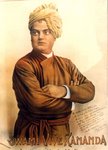There was a certain Yogi who used to practise meditation in a lonely part of the forest, on the banks of a river. There was a poor cowherd, a very ignorant man, who used to tend his herd in that forest. Every day he used to see this same Yogi meditating by the hour, practising austerities, living alone and studying. Somehow the cowherd got curious as to what he did. So he came to the Yogi and said, "Sir, can you teach me the way to God?" This Yogi was a very learned, great man, and he replied, "How will you understand God--you common cowherd? Blockhead, go home and tend your cows and don't bother your head with such things."
The poor fellow went away, but somehow a real want had come to him. So he could not rest, and he came again to the Yogi and said, "Sir, won't you teach me something about God?"
Again he was repulsed: "Oh, you blockhead, what can you understand of God? Go home." But the cowherd could not sleep; he could not eat. He must know something about God.
So he came again; and the Yogi, in order to quiet the man, as he was so insisting, said, "I'll teach you about God."
The man asked, "Sir, what sort of being is God? What is His form? How does He look?"
The Yogi said, "God is just like the big bull in your herd. That is just God. God has become that big bull."
The man believed him and went back to his herd. Day and night he took that bull for God and began to worship it. He brought the greenest grass for that bull, rested close to it and gave it light, sat near it and followed it. Thus days and months and years passed. His whole soul was there [in the bull].
One day he heard a voice, as it were, coming out of the bull. "The bull speaks!" [the cowherd thought.]
"My son, my son."
"Why, the bull is speaking! No, the bull cannot speak."
Again he went away, and sat near, meditating in great misery of his heart. He did not know anything. Again he heard the voice coming out of the bull: "My child, my child."
He went near. "No, the bull cannot speak." Then he went back again and sat despondent.
Again the voice came, and that time he found it out. It was from his own heart. He found that God was in him. Then he learned the wonderful truth of the Teacher of all teachers: "I am with thee always." And the poor cowherd learned the whole mystery.
Then he goes back to the Yogi, and when he is at some distance the Yogi sees him. The Yogi has been the most learned man in the country, practising austerity for years--meditating, studying. And this cowherd, an ignorant blockhead, never studied a book nor learned his letters. But he comes--his whole body, as it were, transfigured, his face changed, the light of heaven shining round his face. The Yogi got up. "What is this change? Where did you get this?"
"Sir, you gave me that."
"How? I told you that in joke."
"But I took it seriously. And I got everything I wanted out of that bull, for is He not everywhere?"
So that bull was the Pratika. And that man worshipped the bull as his Pratika--as God--and he got everything out of it. So that intense love--that desire--brings out everything. Everything is in ourselves, and the external world and the external worship are the forms, the suggestions that call it out. When they become strong, the Lord within awakens.


